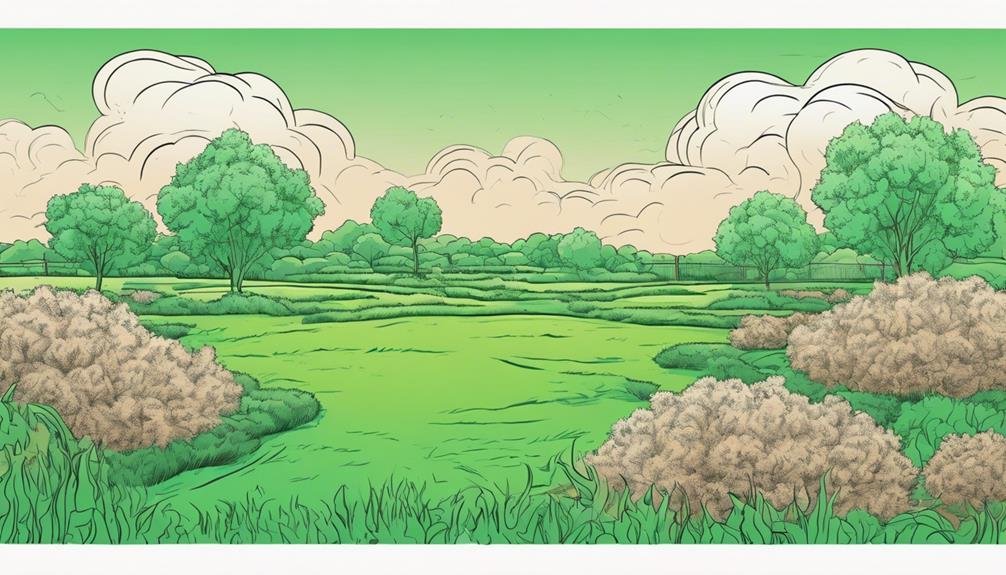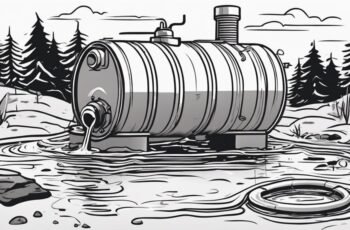You notice unpleasant odors in your yard. Slow draining fixtures in the house, lush green patches on the lawn, and gurgling sounds from drains. These could be signs of a septic tank failure.
But how can you be sure it's time to address this issue before it escalates?
Key Takeaways
- Unpleasant odors in the yard signal potential septic tank failure.
- Slow draining fixtures indicate underlying septic system issues.
- Lush green patches on the lawn suggest drainage and absorption problems.
- Gurgling sounds from drains may indicate septic system complications.
Unpleasant Odors in the Yard

If you detect a foul smell lingering in your yard, particularly near the area of your septic tank, it could indicate a potential septic tank failure. When a septic tank fails, it may lead to soil contamination, posing a risk to both your property and the environment. Prevention is key in avoiding this issue. Regular septic tank maintenance is of utmost importance in ensuring its proper functionality.
Soil contamination can occur when a septic tank malfunctions, leaking harmful bacteria and waste into the surrounding soil. This contamination not only damages your yard but can also seep into groundwater, affecting the quality of nearby water sources. To prevent soil contamination, schedule routine inspections and pump-outs for your septic tank.
Septic tank maintenance plays a crucial role in detecting and addressing potential failures before they escalate. By investing in regular maintenance, you can ensure that your septic system operates efficiently, reducing the risk of soil contamination and environmental harm. Remember, taking proactive steps today can save you from costly repairs in the future.
Slow Draining Fixtures in the House
When faced with slow draining fixtures in your house, it's essential to promptly address the issue to prevent potential septic system complications. Slow drainage can indicate underlying problems that, if not resolved promptly, may lead to more significant issues with your septic tank.
Here are some steps you can take to address slow draining fixtures and ensure your septic system stays healthy:
- Check for Clogs: Start by checking for blockages in the affected drains. Hair, grease, or debris buildup can often cause slow drainage.
- Use Drain Cleaners: Consider using septic-safe drain cleaners to break down clogs and improve water flow.
- Schedule a Plumbing Inspection: If the issue persists, it's advisable to contact a professional plumber to inspect your plumbing system for any potential issues.
- Regular Septic Tank Maintenance: Keep up with routine septic tank maintenance to prevent clogs and ensure the system functions correctly.
Promptly addressing slow draining fixtures through proper maintenance and inspections can help prevent costly septic tank repairs in the future.
Lush Green Patches on the Lawn

Lush green patches on the lawn may indicate potential issues with your septic system's drainage and nutrient absorption. When your lawn displays unusually vibrant green areas, it could be a sign of soil saturation due to drainage issues stemming from a failing septic tank. The excess moisture and nutrients from a malfunctioning system can lead to these patches of lush grass.
Soil saturation occurs when the ground becomes oversaturated with water, preventing proper drainage and causing water to pool on the surface. This can happen when a septic system isn't functioning correctly, leading to an overflow of wastewater that saturates the soil. As a result, the grass above the affected area may appear healthier and greener than the surrounding areas due to the increased nutrient availability.
If you notice these lush green patches on your lawn, it's crucial to have your septic system inspected promptly to address any underlying drainage issues and prevent further damage to your system. Ignoring these signs could lead to more severe septic tank problems down the line.
Gurgling Sounds From Drains
Experiencing gurgling sounds emanating from your drains could indicate potential issues with your septic system's functionality. These sounds are often a result of air bubbles passing through water in the pipes, suggesting a blockage or backup in the system.
To address this concern effectively, consider the following:
- Regular Drain Maintenance: Keeping your drains clean and free from debris can help prevent clogs that lead to gurgling sounds. Use drain strainers and avoid flushing non-biodegradable items down the toilet or sink.
- Plumbing Inspections: Schedule routine inspections by a professional plumber to assess the condition of your pipes and septic system. Early detection of issues can prevent extensive damage and costly repairs.
- Check Ventilation Systems: Ensure that the ventilation system connected to your plumbing is functioning correctly. Poor ventilation can lead to air pressure imbalances, causing gurgling noises.
- Monitor Water Levels: Keep an eye on the water levels in your toilets, sinks, and bathtub. Fluctuating levels could indicate a problem within your septic system that requires immediate attention.
Conclusion
Overall, being aware of the signs of septic tank failure is crucial for maintaining the health and functionality of your septic system.
If you notice unpleasant odors in the yard, slow draining fixtures in the house, lush green patches on the lawn, or gurgling sounds from drains, it may be time to address potential septic tank issues.
Remember, prevention is key to avoiding costly repairs down the line. Stay vigilant and keep your septic system in tip-top shape to avoid any unpleasant surprises.

